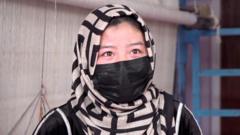**Since the Taliban's takeover, Afghan girls have shifted to low-wage carpet weaving as their only job opportunity, showcasing resilience amid severe restrictions.**
**Afghan Girls Find Work in Carpet Weaving Amid Education Ban**

**Afghan Girls Find Work in Carpet Weaving Amid Education Ban**
**Struggling with school closures, young women turn to textile industry for survival.**
In the heart of Kabul, a bustling carpet workshop serves as a beacon of survival for many young Afghan women and girls who have lost their academic dreams. Under the Taliban regime, which has barred girls over the age of 12 from attending school, many are turning to carpet weaving – one of the few professions allowed for women.
Among the workers is 19-year-old Salehe Hassani, who expresses the sorrow of lost educational opportunities. "We girls no longer have the chance to study," she says with a bittersweet smile. Since the Taliban's return to power in 2021, women have been increasingly sidelined from many careers, pushing them towards labor-intensive jobs like carpet weaving. The United Nations estimates that roughly 1.2 to 1.5 million Afghans rely on this industry, with women accounting for nearly 90% of the workforce.
Despite the booming carpet export market, which saw over $8.7 million in sales in just the first half of 2024, the earnings for these weavers remain shockingly low. Many women report earning only $27 for a square meter of carpet, a task that may take them up to a month to complete. In contrast, carpets can sell for much higher prices abroad, with some fetching up to $18,000, leaving workers feeling exploited.
Industry leaders, like Nisar Ahmad Hassieni, emphasize their commitment to supporting women affected by the educational ban. His company employs hundreds, offering them a stable pay structure. Yet, while some artisans earn higher wages compared to others, the overall working conditions and compensation are often below poverty line thresholds.
The story of sisters Shakila and Samira reveals the broader impact of the Taliban's educational policies. Once students with aspirations of law and journalism, they now navigate the practicalities of survival, working hard to support their family in their modest home. Shakila recounts how her father taught her the art of carpet weaving as a coping strategy during a difficult time, which has since morphed into a critical skill to endure current hardships.
Samira's traumatic memories of a deadly bombing near their school in 2021 have left her with emotional scars, yet her desire to return to education persists. "I wanted to finish my studies," she reflects. Admitting that the security situation has improved since the Taliban’s rise, she still points to closed schools as a barrier to her dreams.
While the challenges are daunting, some young women remain committed to their personal growth. Salehe reveals her pursuit of English studies, undeterred by the barriers to formal education. With hopes of becoming a doctor, she symbolizes the spirit of resilience among Afghan girls who, despite significant pressures, yearn for a brighter future and the opportunity to contribute meaningfully to their society beyond weaving carpets.
Among the workers is 19-year-old Salehe Hassani, who expresses the sorrow of lost educational opportunities. "We girls no longer have the chance to study," she says with a bittersweet smile. Since the Taliban's return to power in 2021, women have been increasingly sidelined from many careers, pushing them towards labor-intensive jobs like carpet weaving. The United Nations estimates that roughly 1.2 to 1.5 million Afghans rely on this industry, with women accounting for nearly 90% of the workforce.
Despite the booming carpet export market, which saw over $8.7 million in sales in just the first half of 2024, the earnings for these weavers remain shockingly low. Many women report earning only $27 for a square meter of carpet, a task that may take them up to a month to complete. In contrast, carpets can sell for much higher prices abroad, with some fetching up to $18,000, leaving workers feeling exploited.
Industry leaders, like Nisar Ahmad Hassieni, emphasize their commitment to supporting women affected by the educational ban. His company employs hundreds, offering them a stable pay structure. Yet, while some artisans earn higher wages compared to others, the overall working conditions and compensation are often below poverty line thresholds.
The story of sisters Shakila and Samira reveals the broader impact of the Taliban's educational policies. Once students with aspirations of law and journalism, they now navigate the practicalities of survival, working hard to support their family in their modest home. Shakila recounts how her father taught her the art of carpet weaving as a coping strategy during a difficult time, which has since morphed into a critical skill to endure current hardships.
Samira's traumatic memories of a deadly bombing near their school in 2021 have left her with emotional scars, yet her desire to return to education persists. "I wanted to finish my studies," she reflects. Admitting that the security situation has improved since the Taliban’s rise, she still points to closed schools as a barrier to her dreams.
While the challenges are daunting, some young women remain committed to their personal growth. Salehe reveals her pursuit of English studies, undeterred by the barriers to formal education. With hopes of becoming a doctor, she symbolizes the spirit of resilience among Afghan girls who, despite significant pressures, yearn for a brighter future and the opportunity to contribute meaningfully to their society beyond weaving carpets.






















